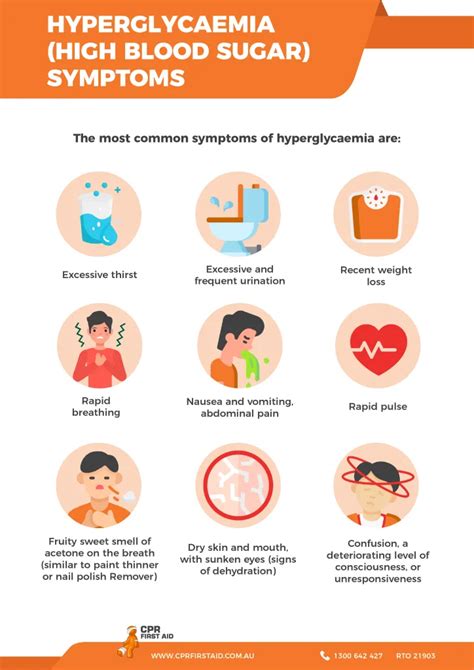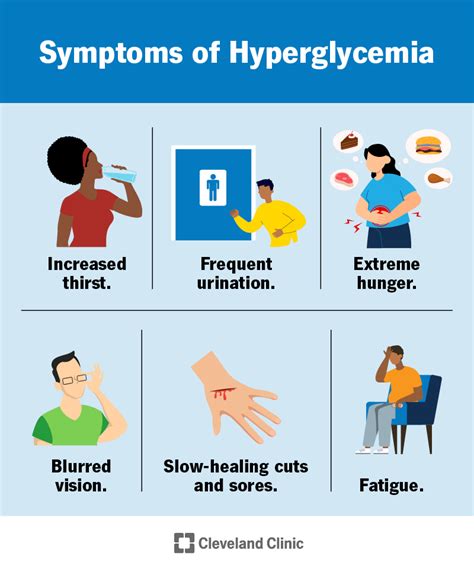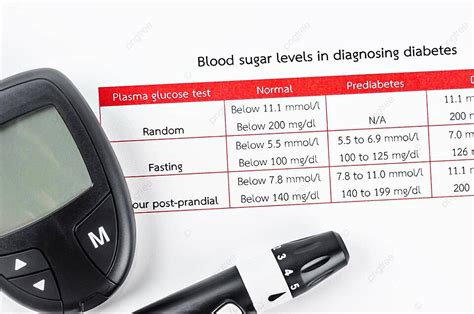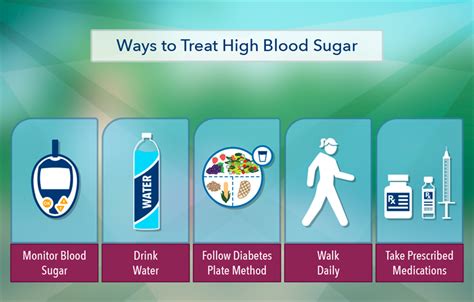Intro
Identify high blood sugar symptoms, including hyperglycemia signs, diabetes warning signs, and glucose imbalance indicators, to manage blood glucose levels and prevent complications like insulin resistance and diabetic emergencies.
High blood sugar, also known as hyperglycemia, is a condition that occurs when the body has too much glucose in the blood. This can happen for a variety of reasons, including eating too many sugary or starchy foods, not taking enough insulin or other diabetes medications, or having an underlying medical condition. High blood sugar can cause a range of symptoms, some of which can be severe and even life-threatening if left untreated. It is essential to recognize the signs of high blood sugar to take prompt action and prevent complications.
High blood sugar symptoms can vary from person to person, but common signs include increased thirst and urination, blurred vision, headaches, and fatigue. Some people may also experience nausea, vomiting, or abdominal pain. In severe cases, high blood sugar can lead to diabetic ketoacidosis, a condition that occurs when the body produces high levels of blood acids called ketones. This can cause symptoms such as difficulty breathing, confusion, and even loss of consciousness. Recognizing the early warning signs of high blood sugar is crucial to preventing these severe complications.
The importance of managing high blood sugar cannot be overstated. If left untreated, high blood sugar can lead to serious health problems, including nerve damage, kidney disease, and increased risk of heart disease and stroke. Furthermore, high blood sugar can also affect a person's quality of life, causing fatigue, irritability, and difficulty concentrating. By understanding the symptoms of high blood sugar and taking steps to manage the condition, individuals can reduce their risk of developing these complications and improve their overall health and well-being.
Understanding High Blood Sugar Symptoms

Common High Blood Sugar Symptoms
Some common high blood sugar symptoms include: * Increased thirst and urination * Blurred vision * Headaches * Fatigue * Nausea and vomiting * Abdominal pain * Rapid heartbeat * Confusion and disorientation These symptoms can vary from person to person, and some people may experience additional symptoms not listed here. If you are experiencing any of these symptoms, it is essential to consult with a healthcare professional to determine the underlying cause and develop an effective treatment plan.Causes of High Blood Sugar

Managing High Blood Sugar
Managing high blood sugar requires a comprehensive approach that includes lifestyle changes, medication, and regular monitoring. Some effective ways to manage high blood sugar include: * Eating a healthy, balanced diet that is low in sugar and starch * Engaging in regular physical activity, such as walking or swimming * Taking insulin or other diabetes medications as prescribed * Monitoring blood sugar levels regularly * Getting enough sleep and managing stress * Quitting smoking and limiting alcohol consumption By making these lifestyle changes and working with a healthcare professional, individuals can effectively manage high blood sugar and reduce their risk of developing complications.Diagnosing High Blood Sugar

High Blood Sugar Treatment Options
Treatment options for high blood sugar depend on the underlying cause and severity of the condition. Some common treatment options include: * Insulin therapy * Oral diabetes medications * Lifestyle changes, such as diet and exercise * Monitoring blood sugar levels regularly * Adjusting medication or insulin doses as needed In some cases, hospitalization may be necessary to treat severe high blood sugar or diabetic ketoacidosis. It is essential to work with a healthcare professional to develop an effective treatment plan and prevent complications.Preventing High Blood Sugar Complications

Living with High Blood Sugar
Living with high blood sugar requires a long-term commitment to managing the condition and preventing complications. Some effective ways to manage high blood sugar include: * Keeping a food diary to track carbohydrate intake * Monitoring blood sugar levels regularly * Taking insulin or other diabetes medications as prescribed * Engaging in regular physical activity, such as walking or swimming * Getting enough sleep and managing stress * Quitting smoking and limiting alcohol consumption By making these lifestyle changes and working with a healthcare professional, individuals can effectively manage high blood sugar and improve their overall health and well-being.Conclusion and Next Steps

We invite you to share your thoughts and experiences with high blood sugar in the comments below. Have you or a loved one been diagnosed with high blood sugar? What lifestyle changes have you made to manage the condition? Share your story and help others understand the importance of managing high blood sugar.
What are the common symptoms of high blood sugar?
+Common symptoms of high blood sugar include increased thirst and urination, blurred vision, headaches, fatigue, nausea, and vomiting.
How is high blood sugar diagnosed?
+High blood sugar is typically diagnosed through a physical exam, medical history, and laboratory tests, such as a fasting plasma glucose test or an oral glucose tolerance test.
What are the treatment options for high blood sugar?
+Treatment options for high blood sugar depend on the underlying cause and severity of the condition, but may include insulin therapy, oral diabetes medications, lifestyle changes, and regular monitoring of blood sugar levels.
How can I prevent high blood sugar complications?
+To prevent high blood sugar complications, it is essential to monitor blood sugar levels regularly, take insulin or other diabetes medications as prescribed, eat a healthy, balanced diet, engage in regular physical activity, and get enough sleep and manage stress.
What are the long-term effects of high blood sugar?
+The long-term effects of high blood sugar can include nerve damage, kidney disease, increased risk of heart disease and stroke, and vision problems, such as blindness or cataracts.
